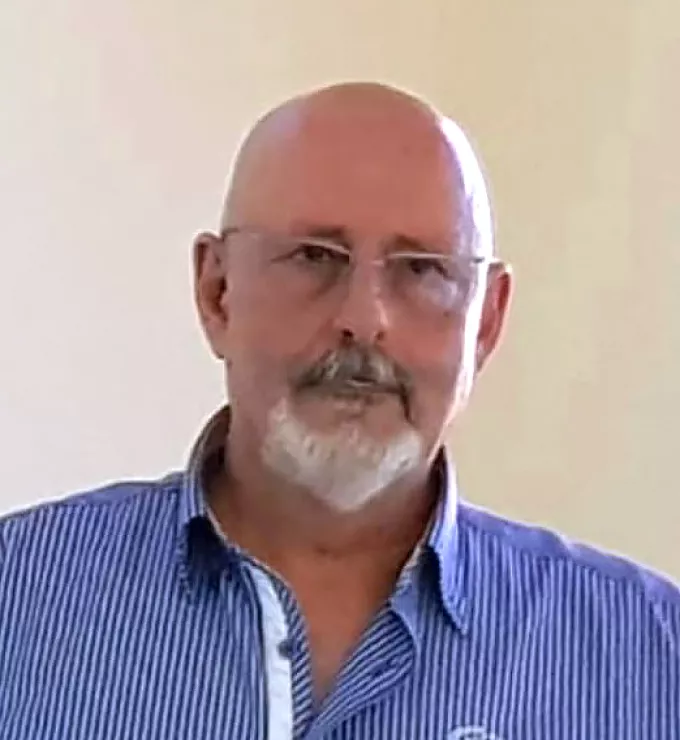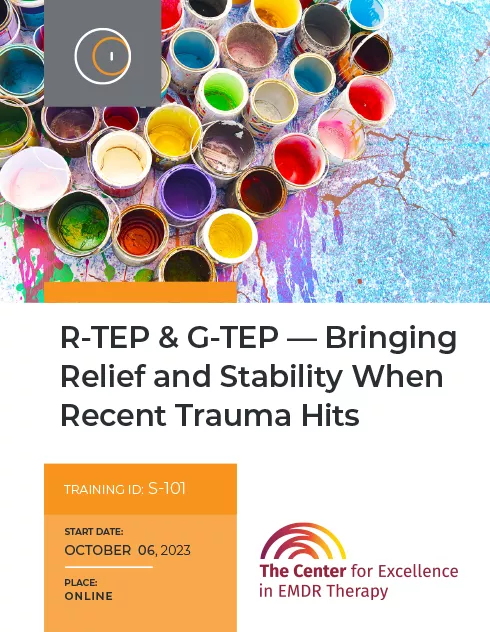R-TEP & G-TEP: Offering Relief and Stability When Recent Trauma Hits
Master EMDR Protocols for Early Intervention in an Unpredictable World

October 22, 2023: 9:00 am - 1:30 pm ET
October 23, 2023: 9:00 am - 1:30 pm ET
Online
admin@emdrtherapy.com
Early Interventions Restore Safety, Strengthen Resilience and Reduce the Likelihood of PTSD
With so many people in the world experiencing natural and human-made disasters; community devastation and interpersonal violence, there is a critical need for early EMDR intervention following traumatic incidents. In 2008, EMDR R-TEP (Recent Traumatic Events Protocol) was developed by Elan Shapiro and Brurit Laub to meet that need. This protocol is now used in disaster areas around the world, for ongoing traumatic stress and for recent traumatic events large and small.
R-TEP is Not Only for Headline-Level Disasters
It is a powerful addition to every EMDR therapists’ repertoire. R-TEP is specifically designed to meet the unique needs arising from recent traumatic events—which differ from those for processing past traumas. R-TEP expands your ability to respond to clients blindsided by a recent trauma or caught in an overwhelming event as it unfolds in real time.
R-TEP, used before the consolidation of a traumatic memory takes place, can reduce connections to past traumas and prevent traumatic memories from accumulating. R-TEP is also shown to enhance adaptive associations, resilience and other measures of 'post-traumatic growth.'
Using R-TEP, you can provide safety and containment to a client who may not be ready for memory processing. It lets you titrate the client's experience without the risk of further destabilization. You can help clients respond adaptively to their difficult situation, especially those that can be ongoing. And with R-TEP you have a clinical roadmap for helping them move through recent traumatic events based on their capacities and circumstances.
R-TEP's Innovations Are Effective for Recent Traumatic Events of All Kinds
The key difference between standard EMDR processing and R-TEP is focus. The three main R-TEP refinements are:
- The “traumatic episode” is tightly defined in terms of images, sensations, feelings and thoughts directly related to the event itself.
- Processing is limited exclusively to elements related to the traumatic event. This focused processing provides client stability and safety and prevents emotional overload.
- Using an EMD strategy for processing the cognitive, visual, auditory, and other sensory intrusions can permanently dissolve disturbing images, sensations or thoughts within minutes—before consolidation of the traumatic memory takes place.
Maria Masciandaro, Psy.D., is your lead trainer for the R-TEP portion of these trainings. She is a certified R-TEP & G-TEP Trainer and a member of The Center faculty. Read more about Maria in 'Meet Your Trainers' below.
Learn to Extend the Power of R-TEP to Groups
G-TEP (Group Traumatic Episode Protocol) expands the reach of early EMDR intervention when resources following a traumatic event are limited. Adapted from R-TEP for use with groups, G-TEP makes it possible to treat large numbers of people simultaneously for acute traumatic experiences and ongoing traumatic stress.
Conceptualized as guided self-help, G-TEP is designed so individuals in a group can work simultaneously on a shared or discrete trauma. Then they process the trauma as they experienced it and in their own terms.
G-TEP uses an art therapy format so clients represent their experience of the trauma episode visually with no verbal articulation of traumatic material. Thanks to simultaneous processing and visual-only representations of the trauma, G-TEP offers protection and benefits to everyone involved.
- It avoids the peril of vicarious traumatization and shame-based exposure for clients.
- It sidesteps language issues with immigrants and refugees as well as with children, teens and anyone who struggle with expressive language.
- G-TEP accommodates diversity among group participants and is flexible so you can use it in all kinds of settings.
- G-TEP's approach de-stigmatizes mental health services with cultural groups who hold negative perceptions of psychotherapy.
Elan Shapiro, Ph.D., is your lead trainer for the G-TEP portion of these trainings. He is the originator of R-TEP in 2008 with Brurit Laub, Ph.D., and G-TEP in 2013 and an Affiliate Trainer at The Center. Read more about Elan in 'Meet Your Trainers' below.
What If EMDR Processing Is Not Possible for So Many, So Quickly?
G-REP (Group Resource Enhancement Protocol) is designed to provide relief and stability when resources for processing are limited. You'll learn how to use this extended resource-only intervention with groups of all kinds. Adapted from G-TEP, G-REP was first developed to meet the needs of refugees from Ukraine. You'll learn to use G-REP as an early intervention following a recent traumatic event to guide group members in connecting to their own inner resources, bolstering their resilience and providing stability and relief until the resources for trauma processing become available.
Maria Masciandaro, Psy.D., is lead trainer for the G-REP portion of this training. She will also assist Elan Shapiro as a facilitator for G-TEP portion of training.
Join Us for a Free Q & A Session with Elan & Maria
It's taking place on Monday, November 13th, for two hours starting at 10:00 am ET/4:00 pm CET. Bring your questions about these early intervention protocols, about integrating them in your practice and about how they may apply to your current cases. Elan, originator of R-TEP and G-TEP, has answers.
Meet Your Trainers
Elan Shapiro

Elan Shapiro Ph.D. became active in EMDR early in his career. He is a Charter member of EMDRIA; a founding member of EMDR Europe and EMDR Israel; and a member of EMDRIA’s Council of Scholars. In 2016, he received the EMDR Europe Association David Servan Schreiber Award for his outstanding contribution to EMDR therapy—as co-developer, with Brurit Laub, of R-TEP in 2008 and developer of G-TEP in 2013. He is popular worldwide as a presenter and training seminar leader. He’s written and co-written over 20 articles on Early EMDR Intervention and continues to research, write, teach and present on the treatment of recent trauma.
Maria Masciandaro

Maria Masciandaro Psy.D., is a licensed psychologist and EMDR therapy professional who specializes in treating recent trauma. She is among the first R-TEP trainers in the US who have been endorsed by the originators of this powerful protocol. She will be your lead trainer in both the R-TEP and G-REP portions of this training. Maria is also an EMDRIA Approved Consultant who mentors EMDR clinicians pursuing EMDRIA Certification as either an EMDR Therapist or Approved Consultant. She is a member of the NJ EMDR Regional Network steering committee and faculty member at The Center for Excellence in EMDR Therapy.
Informational Brochure

Here's What Your Colleagues Say about this Training

